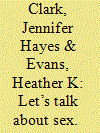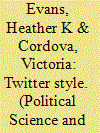|
|
|
Sort Order |
|
|
|
Items / Page
|
|
|
|
|
|
|
| Srl | Item |
| 1 |
ID:
171278


|
|
|
|
|
| Summary/Abstract |
This article examines the factors that influence whether members of Congress tweet about the #MeToo movement. Whereas social-identity theory suggests that congresswomen would be more likely to tweet about #MeToo, congressional research argues that increased polarization has resulted in congresswomen bucking gender stereotypes and embracing more partisan behavior than might otherwise be expected (Pearson and Dancey 2011). We examine how gender, partisanship, and ideology shape the Twitter activity of members of Congress surrounding the #MeToo movement using an original dataset of their tweets since October 2017 when the #MeToo movement gained prominence on Twitter. Our findings show that gender and ideology are the strongest predictors of whether Congress members tweet about the #MeToo movement. Liberals—particularly liberal women—are leading the charge in bringing prominence to the #MeToo movement on Twitter.
|
|
|
|
|
|
|
|
|
|
|
|
|
|
|
|
| 2 |
ID:
110663


|
|
|
|
|
| Publication |
2011.
|
| Summary/Abstract |
Publication in scholarly journals is a key to scholarly success. However, previous studies have shown that across many disciplines, including political science, women publish significantly less than men and prefer to use qualitative methodology. In this article, we explore the accuracy of these trends by examining a decade's worth (2000-09) of women's publications in four top political science journals (the American Political Science Review, the American Journal of Political Science, the Journal of Politics, and PS: Political Science and Politics). Using a systematic content analysis, we determine the gender ratio of the authors, funding sources, methods, and the ratio of qualitative and quantitative studies. We find that while women publish less than men in each of these venues, their publication rates resemble their representation in the field.
|
|
|
|
|
|
|
|
|
|
|
|
|
|
|
|
| 3 |
ID:
096386


|
|
|
|
|
| Publication |
2010.
|
| Summary/Abstract |
Scholarly publication in peer-reviewed journals is widely regarded as the road to scholarly success. However, in a diversity of fields such as sociology, economics, and political science, it has been shown that the rate of publication is much lower for women than for men. The question of whether a systematic relationship exists between gender and research methods has also frequently been debated. In this paper, we explore patterns of authorship and scholarship in two influential interdisciplinary journals, Political Communication and the International Journal of Press/Politics, over the last decade. A systematic content analysis was conducted to determine the gender ratio of authors, the methods and theories employed, and the ratio of quantitative to qualitative research studies. In addition, we tracked the use of primary or secondary data sources and the prevalence of research funding by gender. Overall, we find that while women are publishing less than men, their rate of publication is somewhat higher than their representation in the field.
|
|
|
|
|
|
|
|
|
|
|
|
|
|
|
|
| 4 |
ID:
175296


|
|
|
|
|
| Summary/Abstract |
This article considers whether candidates strategically use emotional rhetoric in social media messages similar to the way that fear appeals are used strategically in televised campaign advertisements. We use a dataset of tweets issued by the campaign accounts of candidates for the US House of Representatives during the last two months of the 2018 midterm elections to determine whether candidate vulnerability predicts the presence of certain emotions in social media messages. Contrary to theoretical expectations, we find that vulnerability does not appear to inspire candidates to use more anxious language in their tweets. However, we do find evidence of a surprising relationship between sad rhetoric and vulnerability and that campaign context influences the use of other forms of negative rhetoric in tweets.
|
|
|
|
|
|
|
|
|
|
|
|
|
|
|
|
| 5 |
ID:
131691


|
|
|
|
|
|
|
|